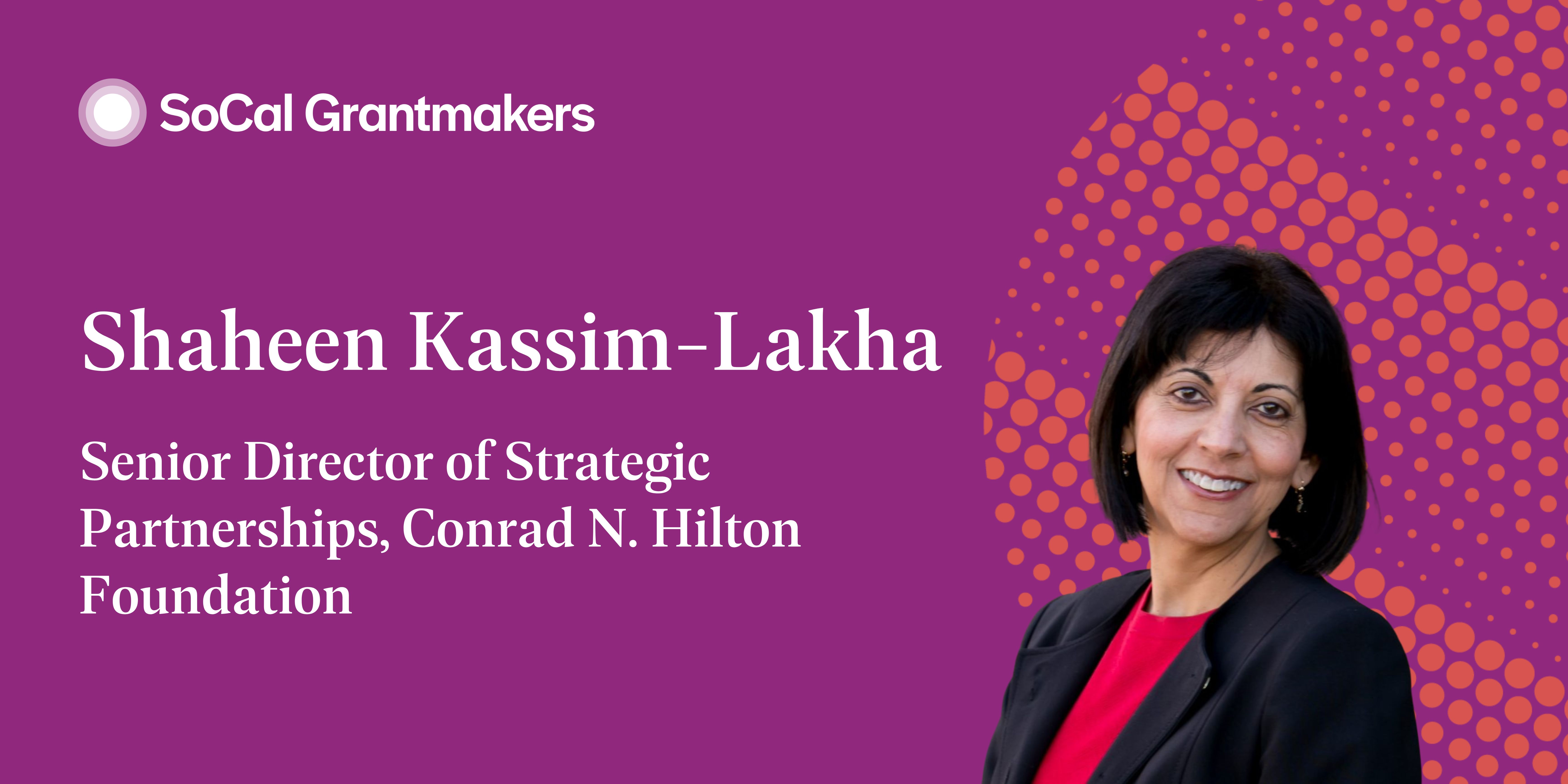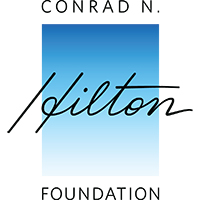Welcoming Shaheen Kassim-Lakha to SCG's Board of Directors!

SoCal Grantmakers is proud to announce that Shaheen Kassim-Lakha (Senior Director of Strategic Partnerships, Conrad N. Hilton Foundation) and Summer Moore (Vice President of Operations, the California Community Foundation) recently joined SCG's Board of Directors. We invite you to learn more about our new Shaeen by reading her bio and a short interview below. Learn more about SCG's Board of Directors.
Dr. Shaheen Kassim-Lakha leads the development and implementation of external engagements, including collaborations with peer funders and local, national, and international partners, to unlock resources and shift policies that enable the Conrad N. Hilton Foundation to multiply its impact. She oversees several program enhancement funds that advance equity and proximate leadership to address systemic and emerging issues. In her previous role as Director of International Programs, Shaheen oversaw the planning, development, implementation, and evaluation of the Hilton Foundation's international program areas that addressed issues impacting communities across the globe, including safe water access, children in communities affected by HIV and AIDS, blindness prevention and education, and disaster relief and recovery. She also led grant programs related to organizational capacity-building, monitoring, evaluation, and learning.
Shaheen has a broad academic and professional background in health services and global health, including experience in hospital administration, developing environmental health policies for urban centers in North America, and program management in several countries in Asia and Africa. She has a Dr. PH from UCLA's School of Public Health. Her doctoral research focused on measuring results and developing an evaluation approach for healthcare philanthropy, as well as graduate training in international development and environmental epidemiology from UCLA and the University of Michigan, Ann Arbor. She has served as a consultant to foundations, governments, and donor organizations on community-based initiatives, regional health systems development, program evaluation, and health policy research.
What drove you to pursue a career in the social impact sector?
From a young age, my family stressed the importance of contributing to the development of our country. I'm from Kenya; back then, it was still a lower-middle-income country. I always knew I would have to apply myself and do something for my community. I gradually became interested in public health, specifically concerning environmental issues. I began to develop an environmental justice outlook when I realized that it's not by accident that people have different levels of exposure to environmental risk factors or determinants of health. After completing my Master's of Public Health at UCLA, I returned home and worked with a local nonprofit on environmental issues. I also helped found a small organization, "Waste Fighters," which tackled waste management in local communities. For a few years, I pursued a career in international development and environmental epidemiology, developing and promoting community-based health initiatives before returning to UCLA to complete my doctorate in health policy. There, I focused my research on measuring results and developing an evaluation approach for healthcare philanthropy.
My career is rooted in my formative years living in Africa and as an immigrant in California. My lived experiences inform my passion for this work and my commitment to being a bridge builder. I am interested in multi-stakeholder partnerships, whether in my work regarding religious pluralism in various communities, small-scale local efforts, or even partnering with government leaders and the United Nations. A seemingly impossible gap exists between local communities and the rooms where major policy decisions get made. This reality transcends borders. I am dedicated to bridging this gap and bringing in the voices of those who have been historically excluded or silenced.
Tell us about your current role at the Conrad N. Hilton Foundation. What are some of your focus areas and notable initiatives?
I currently serve as the Senior Director of Strategic Partnerships at the Conrad N. Hilton Foundation, which includes a significant local, statewide, and national dimension. I lead the development and implementation of external engagements, including collaborations with peer funders and national and international partners to unlock resources and shift policies that enable the foundation to multiply its impact. My role is relatively new within the organization. It is focused on creating strategies and relationships that advance our goals, especially around identifying emerging models for community-driven approaches and supporting organizations closest to the issues of concern.
Some of my current responsibilities include managing and developing newly established grantmaking opportunities that complement the foundation's strategic initiatives tackling emerging issues facing philanthropy. Most notably, I would like to elevate three of our funds. Our Equity Fund aims at combating racism and other forms of bias and injustice across multiple dimensions, including gender, disability, LGBTQ+, and religion, with grants for general operating support and capacity building going to organizations led and governed by historically underrepresented populations across the United States. Our Partnerships Fund identifies and lifts models and interventions that center local and underrepresented communities in leading solutions to address their needs while helping to drive additional resources to more proximate leaders, organizations, and institutions. And finally, our Sector Strengthening Fund includes support for numerous funder collaboratives for more effective philanthropy.
What have you learned about building long-lasting and equity-centered partnerships?
We're still in the early stages. We learned a lot from the pandemic, particularly about the power of building bridges across viewpoints, sectors, and experiences to address structural inequities. Working across organizations and regions, as well as within our own, I see tremendous power in sharing knowledge, making space for community needs and voices, and bridging resources and people with the end goal of positive systemic outcomes.
An example of this is our COVID Response Fund. Initially, we designed it to move resources to respond to the crisis. However, in its later days, it became more focused on equitable access to vaccines and treatments. We were part of the original funding group of the Together Toward Health Initiative, composed of several Southern California foundations. This fund taught us the importance of collaboration and engaging local communities and agencies. Our work in Africa has also been supported through various funder collaboratives like the African Donor Collective. Our impact comes through collaborations, which allow us to reach populations such as farm workers, Indigenous people, and elderly communities. This helps us build more responsive infrastructure to the community's needs. By working with other foundations, government entities, multilateral entities like the UN, and so on, we stand a greater chance of shifting systems.
What is the guiding principle that informs your work?
It always boils down to whose story gets told and listened to. Again, as someone with multiple identities, I know who our country takes seriously, listens to, and deems important. For this reason, I prioritize listening deeply to the people and communities we support. People with lived experience know what's missing and what they need to address their problems, even if they might not have the technological solutions to solve them. As a sector, we must improve at listening to the stories and experiences of the people and communities we serve.
What excites you most as a new member of SCG's Board of Directors?
I have been a member of SCG since 2000, when I was a Senior Program Officer at UniHealth Foundation. I've attended the annual conference almost every year, participated in the inaugural Senior Peer-to-Peer network, and have chaired, organized, and moderated many panels and sessions, including for SCG's signature program, Fundamentals of Effective Grantmaking. I attribute much of my longevity in the sector to the profound personal and professional networks and friendships I have forged through SCG.
I continue to admire the organization's work, especially in recent years that have required the philanthropic sector to be much more courageous and innovative. It is an honor to join SCG's board of directors and collaborate with many incredible leaders committed to advancing transformative change. I hope to contribute to the organization's commitment to addressing new challenges while growing and diversifying its membership, leadership, and staff as part of our collective journey toward a more equitable and thriving society.
